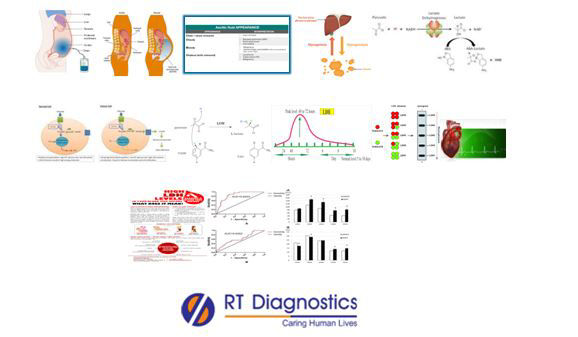LDH – Ascitic Fluid:
Why LDH Ascitic Fluid Test ?
CLINICAL INFORMATION
In General, the enzymes within the cell (cytosol) are impermeable to cell membranes (hence these cellular enzymes cannot enter blood circulation easily) and thus these enzyme activities are very low compared to those within the cell. LDH is also known as ‘lactate dehydrogenase’. This enzyme catalyzes the conversion of lactate to pyruvate. LDH is present in almost every cell in the body- including blood (serum and/or plasma), muscles, brain (CSF sample specimen collected by lumbar puncture also known as a spinal tap), kidneys, liver, lung (eg. empyema), pancreas etc. “Iso-Enzymes” are the multiple forms of the same enzyme that differ in physical properties but they have the same function (similar catalytic activity) eg- they bind to the same substrates (or in other words - They are different variants of the same enzyme having identical functions). Iso-enzymes are of utmost clinical interest since they can be used as molecular markers of tissue damage. The iso-forms of LDH are LDH-1: present in the heart, brain and RBCs, LDH-2: present in the RES – Reticulo-Endothelial System, LDH-3: present in the lungs, LDH-4: present in the kidney, placenta and the pancreas, LDH-5: present in the liver, striated muscles and the brain. LDH test measures the amount of LDH enzyme present in the blood and/or other body fluids. Hence this test looks for signs of damage to the body tissues (eg. Myocardial infarction) and also to know the extent of injury in case of heart, liver, kidney diseases etc. This test is a helpful tool in conditions like hemolytic and/or megaloblastic anaemia, prognosis in cancer treatment etc. The sample specimen is usually an intra-vascular fluid eg. Blood (serum/plasma) and/or body or bio-fluids. High levels of LDH are found in certain pathological conditions such as anaemia, liver diseases, muscle injury, kidney diseases, heart attack (myocardial infarction), pancreatitis, infections like infectious mononucleosis, and encephalitis, meningitis etc, certain cancer types including leukaemia, lymphoma etc. Additional tests include the Troponin-1 (the diagnosis of infarction has been largely superseded by this test) test. Supporting tests include other serum levels of skeletal muscle enzymes or proteins that serve as markers in pathological conditions eg. Creatine kinase (CK), aldolase, myoglobin, troponin, aspartate aminotransferase, and carbonic anhydrase CAIII. But in physiological conditions too for example in strenuous exercises – muscle injury mediated by apoptosis may occur triggered by increased oxidative stress and hence other markers may serve as an important tool like thiobarbituric acid- reactive substances, malondialdehyde, sulfhydryl groups, reduced glutathione, oxidized glutathione, super-oxide dismutase, catalase etc. Other tests include ESR, D-dimer, CRP etc.
Peritoneal fluid analysis is used to help diagnose the cause of fluid build-up in the abdomen (ascites) and/or inflammation of the peritoneum (peritonitis). Tests on the ascetic fluid are performed to know the cause of pathology eg. of liver cirrhosis. Hence peritoneal fluid analysis is used to help diagnose the cause (Transudate or exudate) of fluid build-up in the abdomen (ascites) peritonitis. Transudate and Exudate -This test detects the cause of effusion (such as infection due to bacteria, virus, fungi etc, or non-infectious / inflammatory condition causing peritonitis eg. Congestive heart failure, nephrotic syndrome, hepatic cirrhosis, pancreatitis, ruptured gall bladder, rupture of the appendix, autoimmune diseases etc – Transudate or Exudate) of fluid accumulated in the peritoneal cavity and sometimes around the internal organs. High attenuation of ascites in abdominal ultrasound is thought to be due to high protein and cellular content.
Peritonitis is a medical emergency and if untreated by neglect the infection from the peritoneum can spread throughout the body and result in complications like sepsis (a life-threatening condition which consequently leads to shock, organ failure and eventually death) etc. Other complications of ascites include spontaneous bacterial peritonitis (a life-threatening infection), blood sepsis, migration of fluid into lung cavities, hepato-renal syndrome, weight loss and protein malnutrition, mental confusion, altered consciousness i.e change in the level of alertness and/or COMA (hepatic-encephalopathy). Signs of peritonitis include abdominal pain or tenderness, bloating or feeling of fullness in the abdomen, fever, nausea and vomiting, loss of appetite, diarrhoea, low urine output and thirst. Other tests for ascites performed are clinically based for ascetic fluid are by inspection for bulging flanks, and auscultation. Followed by clinical examination by palpation, flank dullness, shifting dullness etc, for performing ascetic tap. Additional tests include ultrasound and imaging studies like X-Rays, MRI, CT Scan etc. Other tests for confirmation test include cell counts, ESR, CRP, D-dimer, biochemical investigations such as liver function tests (to check impaired liver function), coagulation tests, electrolytes (treatment modalities and the prognosis also requires monitoring of blood biochemistry during the recovery phase), culture and sensitivity tests, molecular techniques like PCR etc. Hence LDH ascetic fluid test is performed to screen to detect the underlying pathology in the abdomen.

General Instructions:
Sample Requirement: Specimen -Ascitic fluid.Test Preparation: As suggested by the doctor.
NOTE - Sample for specimen collections may vary based on the patient’s condition/cases according to the patient’s presenting complaints/signs or symptoms:
SPECIMEN REQUIREMENT (Special or Rare Cases) - As instructed and guided by Physician / Clinician / Pathologist / as per Laboratory’s requirements, according to procedures and protocols.
This Multi-Specialty Clinical Referral Laboratory RT DIAGNOSTICS provides precise and accurate tests with an extensive range of testing services to the medical centres to help in the diagnosis and identification of pathology in the test specimens for infectious diseases and also to evaluate the function of organ systems of the patient. It prevents further complications and helps to stabilize and restore health to near normalcy at the earliest without delay.



